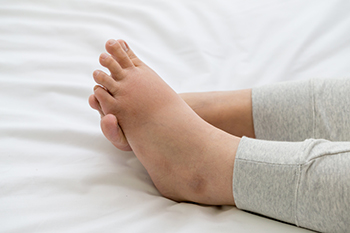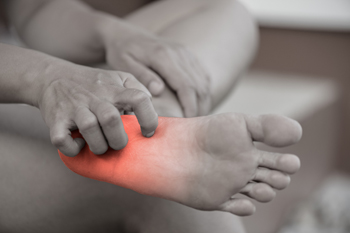Items filtered by date: October 2023
Running Injuries That Affect the Feet and Ankles

Running is a fantastic way to stay fit, boost cardiovascular health, and enjoy the great outdoors. Despite its many benefits, running can also take a toll on your feet and ankles. More than 80 percent of running injuries are attributed to repetitive stress, making it important for runners to be aware of the potential pitfalls and methods to prevent and address them. The repetitive impact of every foot strike during your runs can put significant stress on your muscles, joints, and connective tissues, increasing the risk of injury. Foot injuries are a significant concern for runners. Plantar fasciitis, metatarsalgia, and stress fractures are some of the more common conditions that can affect the feet. These injuries can cause intense pain, particularly during the push off phase of running. Ankles are susceptible to sprains, strains, and ligament injuries in runners. Running on uneven terrain and wearing improper footwear can contribute to these injuries, which may result in instability and limited mobility. If you experience pain or discomfort in the feet or ankles from your running, it is suggested that you make an appointment with a podiatrist for an exam, diagnosis, and tips for preventing injuries.
Exercising your feet regularly with the proper foot wear is a great way to prevent injuries. If you have any concerns about your feet, contact Judson Siegel, DPM of Assabet Family Podiatry. Our doctor will treat your foot and ankle needs.
How to Prevent Running Injuries
Many common running injuries are caused by overuse and overtraining. When the back of the kneecap starts wearing out and starts causing pain in your knee, this is commonly referred to as runner’s knee. Runner’s knee is a decrease in strength in your quadriceps and can occur if you’re not wearing properly fitted or supporting shoes. To prevent runner’s knee, focusing on hip strengthening is a good idea, as well as strengthening your quads to keep the kneecaps aligned.
What Are Some Causes of Running Injuries?
- One cause of a common running injury is called iliotibial band syndrome.
- Plantar fasciitis is also another common injury.
- Stress fractures can occur from overtraining, lack of calcium, or even your running style.
Best Ways to Prevent Running Injuries
- Wear footwear that fits properly and suits your running needs.
- Running shoes are the only protective gear that runners have to safeguard them from injury.
- Make a training schedule. Adding strengthening exercises as well as regular stretching can help keep you strong and limber and can lessen the possibility of injuries.
- Stretching keeps muscles limber; this will help you gain better flexibility.
If you have any questions please feel free to contact our offices located in Plainville, Marlborough, and Somerset, MA . We offer the newest diagnostic and treatment technologies for all your foot and ankle needs.
What is Joint Replacement Surgery?

Joint replacement surgery is a procedure that involves the removal of damaged or diseased portions of a joint and their replacement with artificial components. This surgery becomes necessary when joints deteriorate due to factors like arthritis, prolonged wear and tear, or underlying medical conditions. The primary objectives of foot or ankle joint replacement surgery are to alleviate pain, enhance joint functionality, and improve mobility. Before considering such surgery, podiatrists typically explore alternative treatments, such as exercise regimens, walking aids like canes or walkers, physical therapy, and medications to manage pain and inflammation. While joint replacement surgery can significantly improve a patient's quality of life, it is not without risks. Potential complications include postoperative infections, blood clot formation, and the eventual erosion of the artificial joint surface, which may require revision surgery after 15 to 20 years. If you are experiencing foot or ankle joint issues that have not responded to more conservative treatment, it is suggested that you make an appointment with a podiatrist to discuss whether joint replacement surgery is a viable treatment option for you.
In certain cases, in which the patient suffers from extreme pain or damage in a joint, joint replacement surgery may be deemed useful. If you have constant pain in a foot joint, consult with Judson Siegel, DPM from Assabet Family Podiatry. Our doctor will assess your condition and provide you with quality foot and ankle treatment.
What Is Joint Replacement Surgery?
Over time, joints wear down; this can be exacerbated by diseases and conditions. Joint replacement surgery, also known as arthroplasty, is when a damaged joint is surgically removed and replaced with a prosthesis. Prostheses, which can be made of ceramic, plastic, or metal, act as joints in lieu of an actual joint. One of the most prevalent causes for joint replacement is arthritis.
Arthritis in the Foot
Arthritis can occur in any joint in the body, including in the feet. Common types of arthritis in the foot are osteoarthritis, rheumatoid arthritis, and gout. The big toe is usually where arthritis occurs in the foot; this is known as hallux rigidus.
Joint Replacement Surgery in the Foot
The most common form of joint replacement in the foot is a first metatarsophalangeal (MTP) joint placement. MTP joint replacement surgery is designed to treat hallux rigidus. Surgery is not intensive, and recovery occurs within one to two months after the procedure has been done. Overall, joint replacement surgery is a safe and effective way to treat pain in the joint of the foot.
If you have any questions, please feel free to contact our offices located in Plainville, Marlborough, and Somerset, MA . We offer the newest diagnostic and treatment technologies for all your foot care needs.
Reminder: When Was the Last Time...?
Causes of Swollen Ankles and Feet

Swollen ankles and feet can be a perplexing and uncomfortable issue, often signaling an underlying problem. Several factors can contribute to this condition. One common cause is fluid retention, which can result from sitting or standing for extended periods, high salt intake, or hormonal changes. Additionally, injuries like sprains or strains can lead to localized swelling. Medical conditions, such as heart disease, kidney disease, or venous insufficiency, may also contribute to swollen ankles and feet due to impaired circulation or fluid buildup. Infections, inflammation, or certain medications can play a role as well. Lastly, pregnancy can lead to increased fluid retention and pressure on blood vessels, causing swelling in the lower extremities. Understanding these potential causes is essential for effective management and relief from swollen ankles and feet. If your feet and ankles have become swollen, it is suggested that you visit a podiatrist who can determine what the cause and offer effective relief remedies.
Swollen feet can be a sign of an underlying condition. If you have any concerns, contact Judson Siegel, DPM of Assabet Family Podiatry. Our doctor can provide the care you need to keep you pain-free and on your feet.
Swollen feet are a common ailment among pregnant women and people who stand or sit for extended periods. Aging may increase the possibility of swollen feet and patients who are obese often notice when their feet are swelling too. There may be medical reasons why swollen feet occur:
- Phlebitis - A condition that causes the veins to become inflamed and can also cause leg pain.
- Liver disease - This may lead to low blood levels of albumin which is a protein. This can cause fluid in the blood to pass into the tissues and several areas of the body can become swollen.
- Heart failure - When the heart doesn’t pump properly the blood that is normally pumped back to the heart can pool in the veins of the legs causing swollen feet.
- Kidney disease - One of the main functions of the kidneys is releasing excess fluid in the body. This type of condition can make it difficult for the kidneys to function properly, and as a result the feet may become swollen.
- Deep-vein thrombosis (DVT)- This is a serious condition where blood clots form in the veins of the legs. They can block the return of blood from the legs to the heart which may cause the feet to swell. It is important to be treated by a podiatrist if this condition is present.
Swollen feet can also be caused by bone and tendon conditions, including fractures, arthritis, and tendinitis. Additionally, there may be skin and toenail conditions and an infection may cause the feet to swell. Patients who take medicine to treat high blood pressure may be prone to getting swollen feet.
Many patients elevate their feet to help relieve the swelling and this is generally a temporary remedy. When a podiatrist is consulted the reason behind the swelling can be uncovered and subsequently treated.
If you have any questions please feel free to contact our offices located in Plainville, Marlborough, and Somerset, MA . We offer the newest diagnostic tools and technology to treat your foot and ankle needs.
Pregnancy and Foot Woes

Pregnancy is a transformative journey filled with numerous physical changes, some of which can lead to aches and pains in the feet. These discomforts are often attributed to the body's natural adjustments to accommodate the growing baby. One common issue is swollen feet and ankles, caused by increased blood volume and pressure on leg veins. This can result in edema, a condition where excess fluid accumulates in the feet and ankles, causing swelling and discomfort. Another reason for foot pain during pregnancy is weight gain, which places added stress on the feet, leading to arch pain or plantar fasciitis. Hormonal changes during pregnancy can also affect ligaments and tendons, potentially causing instability and discomfort. To alleviate these discomforts, pregnant individuals are advised to wear supportive, comfortable shoes, and to elevate their feet whenever possible. Additionally, engaging in gentle foot exercises can help to improve circulation and flexibility. Understanding these common aches and pains can help expectant parents navigate this incredible journey with more comfort and confidence. If you would like more information about specific foot conditions during pregnancy, it is suggested that you consult with a podiatrist.
Pregnant women with swollen feet can be treated with a variety of different methods that are readily available. For more information about other cures for swollen feet during pregnancy, consult with Judson Siegel, DPM from Assabet Family Podiatry. Our doctor will attend to all of your foot and ankle needs.
What Foot Problems Can Arise During Pregnancy?
One problem that can occur is overpronation, which occurs when the arch of the foot flattens and tends to roll inward. This can cause pain and discomfort in your heels while you’re walking or even just standing up, trying to support your baby.
Another problem is edema, or swelling in the extremities. This often affects the feet during pregnancy but tends to occur in the later stages.
How Can I Keep My Feet Healthy During Pregnancy?
- Wearing orthotics can provide extra support for the feet and help distribute weight evenly
- Minimize the amount of time spent walking barefoot
- Wear shoes with good arch support
- Wear shoes that allow for good circulation to the feet
- Elevate feet if you experience swelling
- Massage your feet
- Get regular, light exercise, such as walking, to promote blood circulation to the feet
If you have any questions please feel free to contact our offices located in Plainville, Marlborough, and Somerset, MA . We offer the newest diagnostic and treatment technologies for all your foot and ankle needs.
Facts About Diabetic Nerve Pain

Diabetic neuropathy is a common and serious complication of diabetes that affects the nerves, particularly in the legs and feet. Symptoms include numbness and tingling, often starting in the feet and spreading. Other indications of diabetic neuropathy are burning or sharp pain at night, muscle weakness that can impede walking or moving, and loss of balance, which increases the risk of falls. In some patients, skin changes, such as dry or cracked skin, and slow wound healing are common. Causes of diabetic neuropathy include uncontrolled blood sugar levels that can gradually damage nerves, and inflammation that harms nerve fibers. Diabetes can lead to poor circulation because of restricted blood flow to the feet. A family history of neuropathy may increase the risk, and smoking and overuse of alcohol can worsen nerve damage in diabetics. If you are experiencing diabetic neuropathy symptoms in the lower extremities, it is suggested that you make regular appointments with a podiatrist to monitor their progress.
Neuropathy
Neuropathy can be a potentially serious condition, especially if it is left undiagnosed. If you have any concerns that you may be experiencing nerve loss in your feet, consult with Judson Siegel, DPM from Assabet Family Podiatry. Our doctor will assess your condition and provide you with quality foot and ankle treatment for neuropathy.
What Is Neuropathy?
Neuropathy is a condition that leads to damage to the nerves in the body. Peripheral neuropathy, or neuropathy that affects your peripheral nervous system, usually occurs in the feet. Neuropathy can be triggered by a number of different causes. Such causes include diabetes, infections, cancers, disorders, and toxic substances.
Symptoms of Neuropathy Include:
- Numbness
- Sensation loss
- Prickling and tingling sensations
- Throbbing, freezing, burning pains
- Muscle weakness
Those with diabetes are at serious risk due to being unable to feel an ulcer on their feet. Diabetics usually also suffer from poor blood circulation. This can lead to the wound not healing, infections occurring, and the limb may have to be amputated.
Treatment
To treat neuropathy in the foot, podiatrists will first diagnose the cause of the neuropathy. Figuring out the underlying cause of the neuropathy will allow the podiatrist to prescribe the best treatment, whether it be caused by diabetes, toxic substance exposure, infection, etc. If the nerve has not died, then it’s possible that sensation may be able to return to the foot.
Pain medication may be issued for pain. Electrical nerve stimulation can be used to stimulate nerves. If the neuropathy is caused from pressure on the nerves, then surgery may be necessary.
If you have any questions, please feel free to contact our offices located in Plainville, Marlborough, and Somerset, MA . We offer the newest diagnostic and treatment technologies for all your foot care needs.

